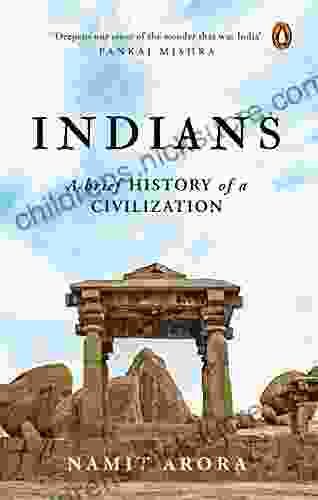Indians: A Brief History Of A Civilization

India, a land steeped in ancient wisdom and cultural heritage, boasts a civilization that has flourished for millennia. Throughout its long and illustrious history, India has witnessed the rise and fall of empires, the birth of religions, and the development of some of the world's most profound philosophies. This article aims to provide a comprehensive overview of India's ancient civilization, tracing its origins, exploring its key periods, and highlighting its enduring contributions to human knowledge and civilization.
The Indus Valley Civilization (c. 2600-1900 BCE)
The earliest known civilization in India, the Indus Valley Civilization, emerged along the banks of the Indus River in the northwestern part of the Indian subcontinent. Known for its advanced urban planning, sophisticated drainage and sanitation systems, and a unique script, the Indus Valley Civilization represents one of the most significant early civilizations in the world.
Key Features:
4.3 out of 5
| Language | : | English |
| File size | : | 16466 KB |
| Text-to-Speech | : | Enabled |
| Screen Reader | : | Supported |
| Enhanced typesetting | : | Enabled |
| X-Ray | : | Enabled |
| Word Wise | : | Enabled |
| Print length | : | 402 pages |
- Flourished in the regions of modern-day Pakistan and northwestern India
- Renowned for its well-planned cities, such as Harappa and Mohenjo-daro
- Developed a standardized system of weights and measures
- Evidences of advanced craftsmanship, including jewelry, pottery, and bronze work
- Possessed a sophisticated script that remains undeciphered to this day
The Vedic Period (c. 1500-500 BCE)
Following the decline of the Indus Valley Civilization, a new era emerged in Indian history, known as the Vedic Period. This period witnessed the arrival of the Aryans, nomadic tribes from Central Asia, who brought with them the Vedas, a collection of sacred texts that would form the foundations of Hinduism.
Key Features:
- Marked by the composition of the four Vedas: Rigveda, Samaveda, Yajurveda, and Atharvaveda
- Development of a social hierarchy and caste system
- Emergence of new religious practices and beliefs
- of Sanskrit, the classical language of India
The Mahajanapadas and Mauryan Empire (c. 600-180 BCE)
During the Mahajanapada Period, several independent kingdoms arose in different parts of India. These kingdoms competed for power and influence, eventually leading to the emergence of the mighty Mauryan Empire. Founded by Chandragupta Maurya, the Mauryan Empire reached its peak under Ashoka, one of India's most renowned emperors.
Key Features:
- Emergence of powerful kingdoms, such as Magadha, Kosala, and Gandhara
- Reign of Ashoka, a great emperor known for his conquests and conversion to Buddhism
- Development of a centralized bureaucracy and legal code
- Spread of Buddhism to other parts of Asia
The Gupta Empire (c. 320-550 CE)
After the decline of the Mauryan Empire, India experienced another golden age under the Gupta Empire. This period witnessed a resurgence of art, culture, and intellectual pursuits. Gupta architecture, sculpture, and painting reached their zenith, and the empire became a hub of learning and scholarship.
Key Features:
- Patronage of the arts and sciences
- Contributions to mathematics, astronomy, and literature
- Development of the decimal system and the concept of zero
- Birth of the Kalidasa, one of India's greatest poets and dramatists
The Middle Ages (c. 550-1200 CE)
The Middle Ages in India were marked by a succession of regional dynasties and empires. Among the most significant were the Chalukyas, Pallavas, and Rashtrakutas in the south, and the Pratiharas, Palas, and Senas in the north. This period also witnessed the arrival of Islam in India and the establishment of the Delhi Sultanate.
Key Features:
- Development of magnificent temples and monuments
- Emergence of new religious movements, such as Bhakti
- Influence of Islam and the establishment of Muslim dynasties
- Rise of regional kingdoms and the decline of a centralized empire
The Mughal Empire (c. 1526-1857 CE)
The Mughal Empire, founded by Babur, was the largest and most powerful empire in Indian history. Under the reign of emperors such as Akbar, Jahangir, and Shah Jahan, the Mughal Empire reached unprecedented heights of cultural and architectural splendor.
Key Features:
- Blending of Islamic and Hindu influences in art and architecture
- Development of Persianate culture and the Urdu language
- Construction of iconic monuments, such as the Taj Mahal and the Red Fort
- Expansion of trade and commerce
- Religious tolerance and patronage of the arts
Colonial Period and Independence (1757-1947 CE)
The Mughal Empire began to decline in the 18th century, and by the mid-19th century, most of India had come under the control of the British East India Company. The colonial period was marked by political and economic exploitation, as well as significant social and cultural changes. India gained independence in 1947 after a long struggle for freedom.
Key Features:
- British colonization and its impact on Indian society
- Emergence of nationalism and the Indian independence movement
- Partition of India into India and Pakistan
- Birth of a new nation and the challenges of nation-building
****
India's ancient civilization is a testament to the ingenuity, resilience, and cultural diversity of its people. From the Indus Valley Civilization to the Mughal Empire, India has witnessed the rise and fall of empires, the development of major religions, and the flourishing of art, literature, and science. The legacy of ancient India continues to shape the country's present-day culture, traditions, and identity. By examining its rich past, we gain a deeper appreciation for the enduring contributions that India has made to human civilization.
4.3 out of 5
| Language | : | English |
| File size | : | 16466 KB |
| Text-to-Speech | : | Enabled |
| Screen Reader | : | Supported |
| Enhanced typesetting | : | Enabled |
| X-Ray | : | Enabled |
| Word Wise | : | Enabled |
| Print length | : | 402 pages |
Do you want to contribute by writing guest posts on this blog?
Please contact us and send us a resume of previous articles that you have written.
 Fiction
Fiction Non Fiction
Non Fiction Romance
Romance Mystery
Mystery Thriller
Thriller SciFi
SciFi Fantasy
Fantasy Horror
Horror Biography
Biography Selfhelp
Selfhelp Business
Business History
History Classics
Classics Poetry
Poetry Childrens
Childrens Young Adult
Young Adult Educational
Educational Cooking
Cooking Travel
Travel Lifestyle
Lifestyle Spirituality
Spirituality Health
Health Fitness
Fitness Technology
Technology Science
Science Arts
Arts Crafts
Crafts DIY
DIY Gardening
Gardening Petcare
Petcare Frank X Sutman
Frank X Sutman Steph Davis
Steph Davis James Freeman
James Freeman Behrouz Moemeni
Behrouz Moemeni Steven Dillon
Steven Dillon David Poyer
David Poyer Gordon Forbes
Gordon Forbes Kristin Knight Pace
Kristin Knight Pace Robin Barrett
Robin Barrett Russ Mitchell
Russ Mitchell Iain Mccalman
Iain Mccalman Shel Banks
Shel Banks Michael Kranish
Michael Kranish Bryson Payne
Bryson Payne Rae Brewer
Rae Brewer Oliver Horovitz
Oliver Horovitz Evelyn Monahan
Evelyn Monahan Dominique Pearson
Dominique Pearson Jennifer Harvey
Jennifer Harvey Benedict Go
Benedict Go Anil Ananthaswamy
Anil Ananthaswamy Ann Mariah Cook
Ann Mariah Cook Daniel Paolicchi
Daniel Paolicchi Jessica Redland
Jessica Redland Sharlene Healy
Sharlene Healy Aditya Chatterjee
Aditya Chatterjee Sue C Funnell
Sue C Funnell Colin Rees
Colin Rees Peter Wacht
Peter Wacht Robin Esrock
Robin Esrock Miyamoto Musashi
Miyamoto Musashi Brent E Turvey
Brent E Turvey Cathy Glass
Cathy Glass Brianna Madia
Brianna Madia Carla Hall
Carla Hall Sharon Cameron
Sharon Cameron John Brockman
John Brockman Kit Deslauriers
Kit Deslauriers Jack O Connor
Jack O Connor Susie Albert Miller
Susie Albert Miller Chuck Robbins
Chuck Robbins Mark Bertin Md
Mark Bertin Md Sherrie Eldridge
Sherrie Eldridge Persia Woolley
Persia Woolley Hunter S Fulghum
Hunter S Fulghum Dr Gareth Moore
Dr Gareth Moore Will Murray
Will Murray John Heart
John Heart Jeff Deters
Jeff Deters George Hincapie
George Hincapie Robert H Shumway
Robert H Shumway Cindy Hudson
Cindy Hudson Govert Schilling
Govert Schilling Ann Bausum
Ann Bausum Brian Smith
Brian Smith Jeremy Griffith
Jeremy Griffith Mia Collins Parker
Mia Collins Parker Roasted Rat
Roasted Rat Emma Anne Bellamy
Emma Anne Bellamy Erling Kagge
Erling Kagge John Romer
John Romer Stephane Cazeault
Stephane Cazeault Shannon Greenland
Shannon Greenland Peter Lee
Peter Lee Rosanne S Mchenry
Rosanne S Mchenry Marck Vaisman
Marck Vaisman Ray Dozier
Ray Dozier Richard Paul Evans
Richard Paul Evans L A Cotton
L A Cotton Benjamin T Mast
Benjamin T Mast Scott Douglas
Scott Douglas Christina Tosch
Christina Tosch Carl J Pratt
Carl J Pratt James Nickells
James Nickells Laurie R King
Laurie R King Richard Weaver
Richard Weaver Rebecca M Warner
Rebecca M Warner Stewart Pearce
Stewart Pearce Beth Berry
Beth Berry Tracy Wolff
Tracy Wolff Julian Guthrie
Julian Guthrie Jade Mckenzie Stone
Jade Mckenzie Stone Barry Correia
Barry Correia Mayur Movalia
Mayur Movalia Eliot Cowan
Eliot Cowan Michael Deshotels
Michael Deshotels Josh Kaufman
Josh Kaufman Warren Berger
Warren Berger Bruce Gregor Hodge
Bruce Gregor Hodge Dr Tracy Sanders
Dr Tracy Sanders Patricia Ann Lynch
Patricia Ann Lynch Miles Cameron
Miles Cameron Michael Harner
Michael Harner Laurie Varga
Laurie Varga Fred Heath
Fred Heath Lori Morrison
Lori Morrison Ann Cameron
Ann Cameron Ann Bingham
Ann Bingham Paul Volponi
Paul Volponi J M Adovasio
J M Adovasio Angie Stanton
Angie Stanton Paul Hough
Paul Hough Nancy Ellen Abrams
Nancy Ellen Abrams Tracy Salcedo
Tracy Salcedo Sandra Steingraber
Sandra Steingraber Edward B Fiske
Edward B Fiske Rico Austin
Rico Austin Shonda Schilling
Shonda Schilling Laura M Ahearn
Laura M Ahearn Darren Kirby
Darren Kirby Imre Lakatos
Imre Lakatos Simon Winchester
Simon Winchester Paul Fowler
Paul Fowler Brian Platzer
Brian Platzer Dean Karnazes
Dean Karnazes John Frohnmayer
John Frohnmayer Tyler Ninja Blevins
Tyler Ninja Blevins Imogen Barnacle
Imogen Barnacle Kalman Samuels
Kalman Samuels Sharan B Merriam
Sharan B Merriam Michael S A Graziano
Michael S A Graziano Thomas Lewis
Thomas Lewis Sarah Albee
Sarah Albee Julius Evola
Julius Evola Tim Leffel
Tim Leffel David Roche
David Roche Michael Edelson
Michael Edelson Wendy Lyons Sunshine
Wendy Lyons Sunshine Janet Renner
Janet Renner Joan Didion
Joan Didion Helen Yang
Helen Yang Ann Chamberlin
Ann Chamberlin Eugene Hecht
Eugene Hecht Ann Israel
Ann Israel Bruce Ackerberg
Bruce Ackerberg Robison Wells
Robison Wells Karen Lynch
Karen Lynch David Rakel
David Rakel Peter Feinman
Peter Feinman Gavin Atkin
Gavin Atkin Joe Shuber
Joe Shuber Bob Stegner
Bob Stegner Jean Molesky Poz
Jean Molesky Poz Michael Easter
Michael Easter J M Gregson
J M Gregson Ben Magid
Ben Magid William Lee
William Lee Emma Hansen
Emma Hansen Tahereh Mafi
Tahereh Mafi Frank Mastini
Frank Mastini Sherman Dickinson
Sherman Dickinson Scholastic
Scholastic Marc Roche
Marc Roche Ed Robinson
Ed Robinson Gary Sutherland
Gary Sutherland Buster Holmes
Buster Holmes Sean Parker Dennison
Sean Parker Dennison Jon G Hughes
Jon G Hughes Angelo Tropea
Angelo Tropea Katherine Keith
Katherine Keith Nikki Goth Itoi
Nikki Goth Itoi J L Heilbron
J L Heilbron Ann Imig
Ann Imig Angie Papple Johnston
Angie Papple Johnston Kumiko Makihara
Kumiko Makihara Clinton Bailey
Clinton Bailey Doug Cook
Doug Cook Charlene Beswick
Charlene Beswick Lisa Hoehn
Lisa Hoehn Paul Vachon
Paul Vachon Judy Goodspeed
Judy Goodspeed Eric Hanauer
Eric Hanauer Peter Croker
Peter Croker Caleb Lee
Caleb Lee Mary Helen Bowers
Mary Helen Bowers Dr Mike Dilkes
Dr Mike Dilkes M K Hume
M K Hume Je Earl
Je Earl Nick Schade
Nick Schade Stu Ingraham
Stu Ingraham Felicity Aston
Felicity Aston Chris Townsend
Chris Townsend Jack El Hai
Jack El Hai Tri Thong Dang
Tri Thong Dang Isla Gordon
Isla Gordon Flor M Salvador
Flor M Salvador Anita Cortez
Anita Cortez Cynthia Miller Idriss
Cynthia Miller Idriss Joshua Slocum
Joshua Slocum Ann Marie Brown
Ann Marie Brown Julie Cwikla Phd
Julie Cwikla Phd Kaylind Olson
Kaylind Olson Emily R King
Emily R King Justin Mcelroy
Justin Mcelroy Jenny Carr
Jenny Carr Elliott Mendelson
Elliott Mendelson Lindsey Fitzharris
Lindsey Fitzharris John Monyjok Maluth
John Monyjok Maluth Deborah J Bennett
Deborah J Bennett J M Thompson
J M Thompson William S Frisbee Jr
William S Frisbee Jr Eric Alpenfels
Eric Alpenfels Kristen S Kurland
Kristen S Kurland Gina Atencio Maclean Psyd
Gina Atencio Maclean Psyd Mark Chang
Mark Chang David Deming
David Deming Ann Douglas
Ann Douglas Michael Yessis
Michael Yessis Marke Bieschke
Marke Bieschke Grant Mcomie
Grant Mcomie Elena Delle Donne
Elena Delle Donne Nouaoui Khedidja
Nouaoui Khedidja Karl Deisseroth
Karl Deisseroth Dan Hicks
Dan Hicks Thomas Thompson
Thomas Thompson F C Yee
F C Yee Paul Stewart
Paul Stewart Willie Mosconi
Willie Mosconi J Budziszewski
J Budziszewski Simon Boulter
Simon Boulter Judith A Muschla
Judith A Muschla Karen Jettmar
Karen Jettmar Beth Cavenaugh
Beth Cavenaugh Comni S Art Publishing
Comni S Art Publishing Antonia Malchik
Antonia Malchik Marc Weissbluth M D
Marc Weissbluth M D Tommy Shea
Tommy Shea Jada Fisher
Jada Fisher Melissa Watson
Melissa Watson Julie Gianelloni Connor
Julie Gianelloni Connor Don Larsen
Don Larsen Lisa Charlebois
Lisa Charlebois Edward O Thorp
Edward O Thorp Becky Choi
Becky Choi Bookrags Com
Bookrags Com Nicholas Wade
Nicholas Wade Gregory J Stewart
Gregory J Stewart 2nd Edition Kindle Edition
2nd Edition Kindle Edition Robert G Bugge
Robert G Bugge Rick Clark
Rick Clark Robert Edelman
Robert Edelman Stephen G Post
Stephen G Post Henry A Giroux
Henry A Giroux Anja Beran
Anja Beran Illustrated Edition Kindle Edition
Illustrated Edition Kindle Edition Ryan Tandler
Ryan Tandler Frances Gies
Frances Gies Rachel Levin
Rachel Levin Peter Liljedahl
Peter Liljedahl John Feinstein
John Feinstein Kevin Robbins
Kevin Robbins Laurence Gonzales
Laurence Gonzales William H Parker
William H Parker Jean Paul Pequegnot
Jean Paul Pequegnot Dick Crouser
Dick Crouser Tom Mole
Tom Mole Douglas Turkington
Douglas Turkington Terry Tempest Williams
Terry Tempest Williams Danielle Centoni
Danielle Centoni Stanley Vestal
Stanley Vestal Megan Hallett
Megan Hallett Beth A Grosshans
Beth A Grosshans Felice Benuzzi
Felice Benuzzi William J Ray
William J Ray Ariel Dalfen
Ariel Dalfen Poul Anderson
Poul Anderson Al Goldis
Al Goldis Tabatha Chansard Phd
Tabatha Chansard Phd Nims Purja
Nims Purja Intisar Khanani
Intisar Khanani Wendy Moore
Wendy Moore Gail Carriger
Gail Carriger Elwyn Hayes
Elwyn Hayes Chad Wesley Smith
Chad Wesley Smith Sherri Mitchell
Sherri Mitchell Iri Cermak
Iri Cermak Brook Waters
Brook Waters Richard Rorty
Richard Rorty Joshua Wright
Joshua Wright Elizabeth G Harper
Elizabeth G Harper R H Charles
R H Charles Emiko Jean
Emiko Jean Marissa Zwetow Lmft
Marissa Zwetow Lmft Duncan Van Dusen
Duncan Van Dusen Len Kravitz
Len Kravitz Richard Karban
Richard Karban John Novosel
John Novosel Eric Wargo
Eric Wargo Larry Mueller
Larry Mueller Ann Cook
Ann Cook David J Wallin
David J Wallin Tim Guest
Tim Guest Sadie Lake
Sadie Lake Ava Richardson
Ava Richardson Graham Allcott
Graham Allcott Sharon N Covington
Sharon N Covington Samuel G Puryear
Samuel G Puryear Martin L Kutscher
Martin L Kutscher Lisa Gardner
Lisa Gardner Jerry C Whitaker
Jerry C Whitaker Pete Earley
Pete Earley T Chris Riley Tillman
T Chris Riley Tillman Brian Hayden
Brian Hayden Bill Fowler
Bill Fowler Joe Fox
Joe Fox Jenna Tinsley
Jenna Tinsley Anthony Castrovince
Anthony Castrovince Michele Caputo
Michele Caputo Jane Goodall
Jane Goodall Deborah Hunter Kells
Deborah Hunter Kells Ann Leary
Ann Leary Tina Payne Bryson
Tina Payne Bryson Jennifer Dugan
Jennifer Dugan Sara Zaske
Sara Zaske Magnus D Jango
Magnus D Jango Ryan Boudreaux
Ryan Boudreaux Steve Economides
Steve Economides Jimmy Song
Jimmy Song Ichigo Takano
Ichigo Takano Joshua Straub
Joshua Straub Neil Smith
Neil Smith Baby Professor
Baby Professor Joshua Glenn
Joshua Glenn Joanna Nylund
Joanna Nylund Chris Matakas
Chris Matakas Vivienne Crow
Vivienne Crow Little Mat
Little Mat Frank Falcinelli
Frank Falcinelli Ray Walker
Ray Walker Paul Twitchell
Paul Twitchell Val Waldeck
Val Waldeck Stan Lee
Stan Lee Scott Cunningham
Scott Cunningham Dale Grdnic
Dale Grdnic Shirley Maclaine
Shirley Maclaine Lin Lougheed
Lin Lougheed Daxton Wilde
Daxton Wilde James A Fain
James A Fain Tabatha Yeatts
Tabatha Yeatts David J Lieberman
David J Lieberman Jim Burris
Jim Burris Remmi Smith
Remmi Smith Mike Lowery
Mike Lowery Cgp Books
Cgp Books Dale Peterson
Dale Peterson Jennie Germann Molz
Jennie Germann Molz Clayton Geoffreys
Clayton Geoffreys Hugh Harris
Hugh Harris Tom Dokken
Tom Dokken Myron Mixon
Myron Mixon Jazmine Mccoy
Jazmine Mccoy Scott Haugen
Scott Haugen Douglas Axe
Douglas Axe Deborah Reber
Deborah Reber Kate Bowler
Kate Bowler Alana Ash
Alana Ash Phoenix Nature
Phoenix Nature Sandra Cisneros
Sandra Cisneros Vicki Lansky
Vicki Lansky Don Jose Ruiz
Don Jose Ruiz Johnny Molloy
Johnny Molloy Paul Eng
Paul Eng Jason Rosenhouse
Jason Rosenhouse Peter Julius Sloan
Peter Julius Sloan Emile Durkheim
Emile Durkheim Lindsey Hutchinson
Lindsey Hutchinson Jim Grimsley
Jim Grimsley Ron Rhodes
Ron Rhodes Elisa S Amore
Elisa S Amore Victoria Clarke
Victoria Clarke Waysun Liao
Waysun Liao Brian Burke
Brian Burke Nick Clausen
Nick Clausen Christina Mcghee
Christina Mcghee Darlene D Pedersen
Darlene D Pedersen Weston Ochse
Weston Ochse Bob Greene
Bob Greene Helen Czerski
Helen Czerski Donovan Buck
Donovan Buck Steven Cowie
Steven Cowie Tony Butt
Tony Butt Steph Jagger
Steph Jagger Susanne Elizabeth Freidberg
Susanne Elizabeth Freidberg Jean Rose
Jean Rose Damo Mitchell
Damo Mitchell Eric B Taylor
Eric B Taylor Michelle Hercules
Michelle Hercules Max M Houck
Max M Houck Rebecca Rolland
Rebecca Rolland Dorothy Roberts
Dorothy Roberts Mark Wilson
Mark Wilson Philip P Massaro
Philip P Massaro Jena Pincott
Jena Pincott Judy Cannato
Judy Cannato Jan Witkowski
Jan Witkowski Guy Deutscher
Guy Deutscher Marley Hall
Marley Hall Shannon Philpott Sanders
Shannon Philpott Sanders Dr Richard L Travis
Dr Richard L Travis Ray Bergman
Ray Bergman Tanya Holland
Tanya Holland Kathy Borkoski
Kathy Borkoski Susan Zimmermann
Susan Zimmermann Henny Bogan
Henny Bogan Johnegreek
Johnegreek Alex Bonham
Alex Bonham Jeff A Johnson
Jeff A Johnson Kim Loraine
Kim Loraine Brendan Leonard
Brendan Leonard Robert Jervis
Robert Jervis Erin Davis
Erin Davis Kathy Fray
Kathy Fray Rc Blakes Jr
Rc Blakes Jr Terry Hill
Terry Hill Elissa Altman
Elissa Altman Sarah Pink
Sarah Pink J W Lynne
J W Lynne Vera Snow
Vera Snow Michael Harris
Michael Harris Tami Oldham Ashcraft
Tami Oldham Ashcraft Ronald M Holmes
Ronald M Holmes David Robert Grimes
David Robert Grimes John Krige
John Krige Art Clepper
Art Clepper Norman Hall
Norman Hall Gary Robert Muschla
Gary Robert Muschla Sankofa Ra
Sankofa Ra Sean Deveney
Sean Deveney Presh Talwalkar
Presh Talwalkar Sara Wolf
Sara Wolf Emily Teeter
Emily Teeter Robert A Sadowski
Robert A Sadowski Stephanie Garber
Stephanie Garber Anita Knight Kuhnley
Anita Knight Kuhnley Reed Mangels
Reed Mangels Max Kuhn
Max Kuhn Mary O Hora
Mary O Hora Julie Watson
Julie Watson D J Taylor
D J Taylor Natale Barca
Natale Barca Kenneth Wilgus Phd
Kenneth Wilgus Phd Sara Dykman
Sara Dykman Wade Bourne
Wade Bourne James Campbell
James Campbell Janet Patkowa
Janet Patkowa Deena Kastor
Deena Kastor Namit Arora
Namit Arora Larry Greene
Larry Greene Rob Kelley
Rob Kelley Frederick Lewis Allen
Frederick Lewis Allen Phil G Tang
Phil G Tang Quinn Loftis
Quinn Loftis Peter Galison
Peter Galison Tennille Chaffin
Tennille Chaffin Martina Sprague
Martina Sprague Hippocrates
Hippocrates Mark Mayfield
Mark Mayfield Sean Vigue
Sean Vigue Discover Press
Discover Press Tim Kimmel
Tim Kimmel Wendy Mogel
Wendy Mogel Scott Keyes
Scott Keyes Sarah J Tracy
Sarah J Tracy Jeff Driscoll
Jeff Driscoll Molly Harper
Molly Harper Julie Knutson
Julie Knutson Jason Aaron
Jason Aaron Richard J Davidson
Richard J Davidson Kevin Callan
Kevin Callan Mari Silva
Mari Silva Anita Biase
Anita Biase Yuri Kitayama
Yuri Kitayama Rachel Hartman
Rachel Hartman Angie Thomas
Angie Thomas Jody Vasquez
Jody Vasquez Ania G
Ania G Dick Pobst
Dick Pobst Shalane Flanagan
Shalane Flanagan Bruce Feiler
Bruce Feiler David M Gitlitz
David M Gitlitz Daniel Harman
Daniel Harman Tyler Feder
Tyler Feder Kamran Nazeer
Kamran Nazeer One Exam Prep
One Exam Prep Elizabeth Wayland Barber
Elizabeth Wayland Barber Chris Dombrowski
Chris Dombrowski Joy Bauer
Joy Bauer Oswald Rivera
Oswald Rivera Christof Koch
Christof Koch Shane Frederick
Shane Frederick Enrique Desmond Arias
Enrique Desmond Arias Sadie Word
Sadie Word Nicholaos Kehagias
Nicholaos Kehagias Terry Leiden
Terry Leiden Katherine Nichols
Katherine Nichols Anjeanette Carter
Anjeanette Carter L R Shorter
L R Shorter Dickie Bird
Dickie Bird Lara Maiklem
Lara Maiklem Bill Bishop
Bill Bishop David E Maranz
David E Maranz Jessica Hall
Jessica Hall John J Kaag
John J Kaag
Light bulbAdvertise smarter! Our strategic ad space ensures maximum exposure. Reserve your spot today!

 Glen PowellThe Ultimate Guide to Self Help for Young Adults: Discover Your Potential and...
Glen PowellThe Ultimate Guide to Self Help for Young Adults: Discover Your Potential and...
 Percy Bysshe ShelleyPractice Tests and Review for the Inpatient Obstetric Nurse Exam: A...
Percy Bysshe ShelleyPractice Tests and Review for the Inpatient Obstetric Nurse Exam: A... Yasunari KawabataFollow ·13.8k
Yasunari KawabataFollow ·13.8k Benji PowellFollow ·18k
Benji PowellFollow ·18k Haruki MurakamiFollow ·3.9k
Haruki MurakamiFollow ·3.9k Thomas MannFollow ·15.8k
Thomas MannFollow ·15.8k Jeffrey CoxFollow ·8.4k
Jeffrey CoxFollow ·8.4k Levi PowellFollow ·14.1k
Levi PowellFollow ·14.1k J.D. SalingerFollow ·15.4k
J.D. SalingerFollow ·15.4k Ethan GrayFollow ·3.5k
Ethan GrayFollow ·3.5k

 Ernest J. Gaines
Ernest J. GainesMy Golf Blog Revolution: Open Stance
Are you ready to revolutionize your golf...

 Gene Powell
Gene PowellThe Unparalleled Genius of Calculus Volume Ichigo Takano:...
: The Birth of a...

 Edgar Hayes
Edgar HayesChild of the Northern Spring: A Journey of Discovery and...
In the heart of...

 Anthony Wells
Anthony WellsHybrid Aria: A Harmonious Blend of Modern Comfort and...
In the heart of a bustling...
4.3 out of 5
| Language | : | English |
| File size | : | 16466 KB |
| Text-to-Speech | : | Enabled |
| Screen Reader | : | Supported |
| Enhanced typesetting | : | Enabled |
| X-Ray | : | Enabled |
| Word Wise | : | Enabled |
| Print length | : | 402 pages |










